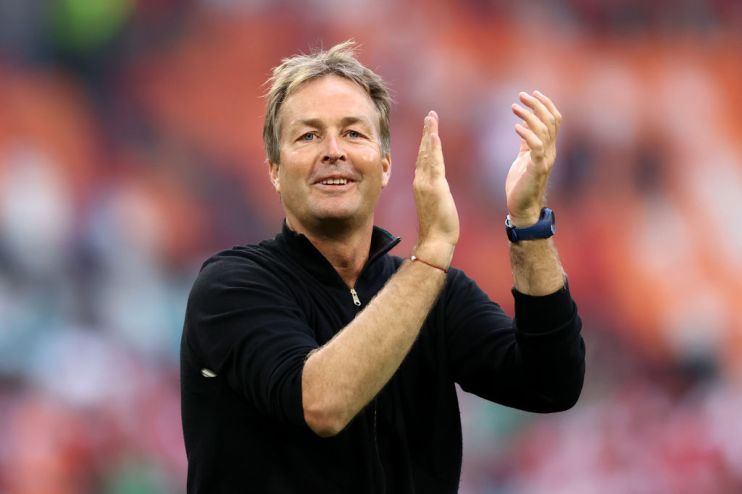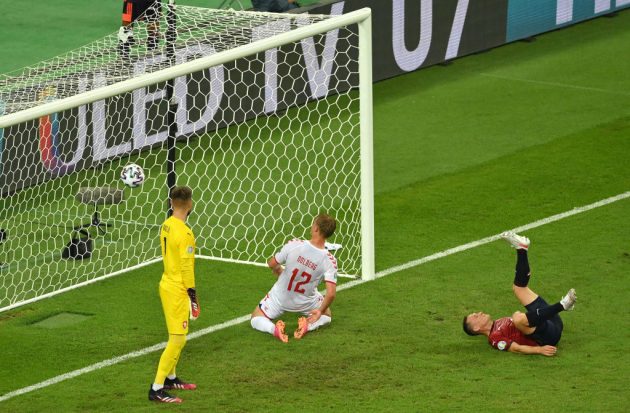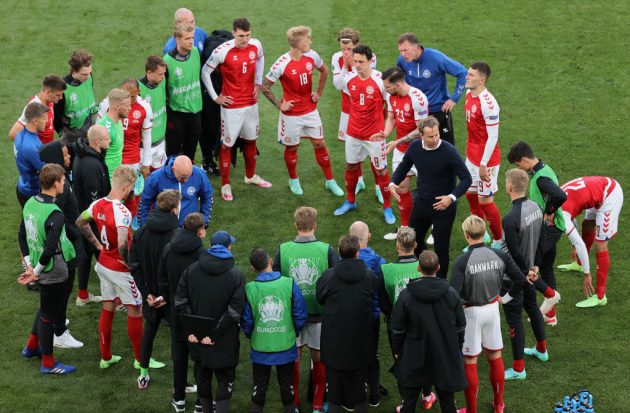Meet Kasper Hjulmand, the ‘tactical geek, football idealist and world-class coach’ of Denmark plotting England exit in Euro 2020 semi-finals

A joke doing the rounds in Denmark is that if Kasper Hjulmand stood for election now he would be voted in as prime minister by a landslide.
Hjulmand’s rocketing popularity is partly down to his steering of the national team to a Euro 2020 semi-final, where they will meet England at Wembley on Wednesday evening.
But it also stems from his compassionate and statesmanlike response to his star player Christian Eriksen suffering a cardiac arrest during Denmark’s opening game of the tournament.
Thrust into the spotlight by triumph and trauma, Hjulmand has shown the qualities that have long marked the 49-year-old out from other football managers.
“A tactical geek and a football idealist,” is how Tom Vernon, his former employer at Danish club FC Nordsjaelland describes him.
Vernon says he recruited Hjulmand because he was “values-driven and wanted to do unique things in football”, traits that were particularly important at Nordsjaelland, which Vernon has successfully integrated with his Ghana-based football academy Right to Dream.
Hjulmand was already a club hero, having led Nordsjaelland to their only league title and into the Champions League group stage in 2012.
Still, former Manchester United scout Vernon admits it was only once he began working with Hjulmand that he realised how good a coach he was.
“He is a world-class coach and better than anyone I’d seen in my Premier League experiences,” he says.
How Hjulmand tactical tweaks have got Denmark punching above their weight
When Hjulmand left Nordsjaelland in 2014 it was to succeed Thomas Tuchel at Mainz, and there are some footballing parallels with the Champions League-winning Chelsea boss.
“He’s extremely detail-oriented as a coach and very tactical,” says Vernon. “And we’ve seen that at this tournament.”
While the Eriksen incident has naturally dominated storylines around the Denmark, Vernon says Euro 2020 has showcased Hjulmand’s tactical expertise.
“The way he’s set up, the way he’s adapted quickly, his timing of substitutions has been phenomenal,” he says.
“It’s had to be as well, because Denmark is punching above its weight in terms of where it’s got to.”

Adam Scully, who writes about tactics for Total Football Analysis, agrees.
Hjulmand has become known for his canny in-game tweaks and used three different formations in last weekend’s quarter-final win over the Czech Republic.
“That flexibility is probably the biggest factor in them going so far,” says Scully.
Unlike his predecessor Age Hareide, Hjulmand favours an expansive possession game but, depending on the opposition, will also ask his team to sit back.
“He’s really good at tweaking the system and he always seems to hit the nail on the head,” says Scully.
Denmark’s default formation is a 3-4-3 but they have also used 4-4-3 and 5-2-3 at Euro 2020.
If there is a flaw in this approach it may be that Hjulmand’s Plan A can leave them vulnerable defensively, says Scully.
The ‘perfect coach’ to lead Denmark during Eriksen fallout
One of Hjulmand’s other preoccupations is character development and the application of traditional values.
“He’s always been fascinated with how pretty old Danish tradition and philosophy is brought into a modern, relevant context for football,” says Vernon.
That made Hjulmand the ideal spokesman for the team after they rallied around Eriksen in such admirable fashion, despite their own obvious distress.
“He’s the perfect coach to articulate to the country what happened in that regard and he’s been able to do that,” Vernon adds.
Hjulmand, who was forced to retire as a player at the age of 26 by injury, has dealt with more than his share of hardship.
His uncle died after suffering a heart attack playing football, his assistant, former Celtic player Morten Wieghorst, has had to overcome a debilitating condition that affected his nervous system, while one of his former Nordsjaelland players spent two weeks in a coma and had his foot amputated after being hit by lightning.

Hjulmand’s obvious humanity invites comparisons with his opposite number at Wembley.
But while Gareth Southgate is part of a much bigger England set-up that has made fostering certain values part of its long-term strategy, Hjulmand was dealt a very different hand.
He wasn’t even meant to be in charge of Denmark at Euro 2020; Hareide had a contract until after the tournament only for it to expire while the championship was delayed by the pandemic.
The flip side of that, however, has been the scant time it has afforded Hjulmand to make his mark on the team.
“I think that everything he was planning to do over a period of time to make the Danish team successful seems to have been thrust on him in a matter of months,” says Vernon.
“But because his head’s been in that space for 20 years already, how to unite the nation, then the experience of Eriksen has brought it forward much more quickly. But he’s been ready for it and able to respond.”
Demanding Hjulmand now ‘everyone’s cup of tea’
Hjulmand’s approach has at times made his path in management a bumpy one.
He is “very challenging as a coach and constantly demanding according to his vision”, says Vernon.
“He’s always been trying to find a way to steer football back to its original values and a slightly purer form.”
That outlook has been cited as the cause of some tensions at Mainz, where he lasted nine months despite a strong start.
“He was always viewed as an idealist and not everybody’s cup of tea. I think he’s everybody’s cup of tea now,” he says. “This is the perfect job for him.”
